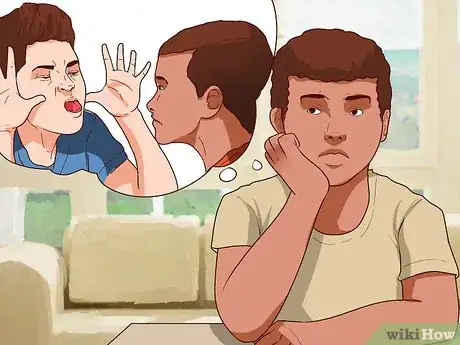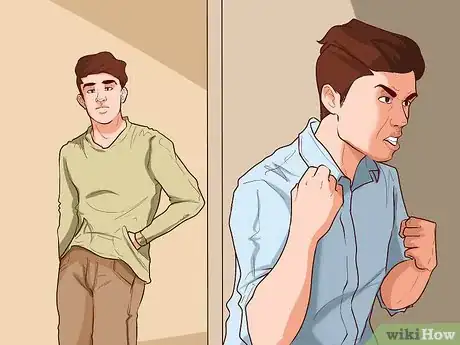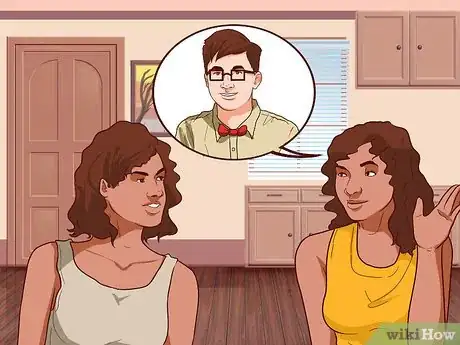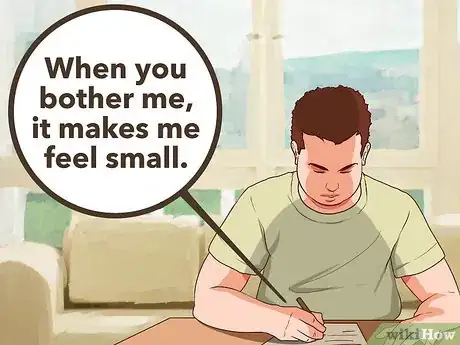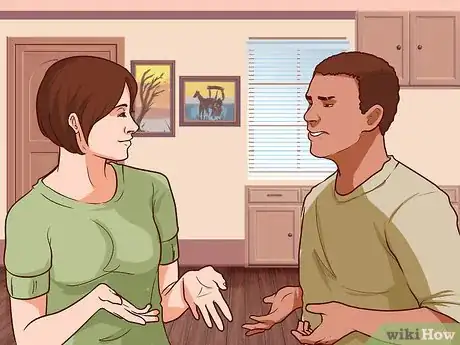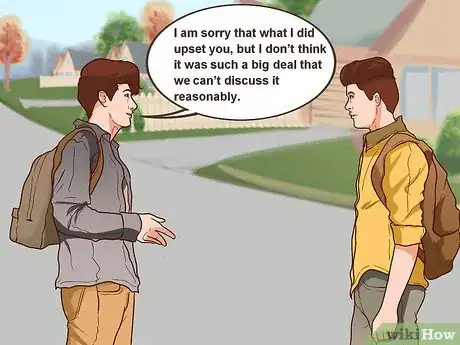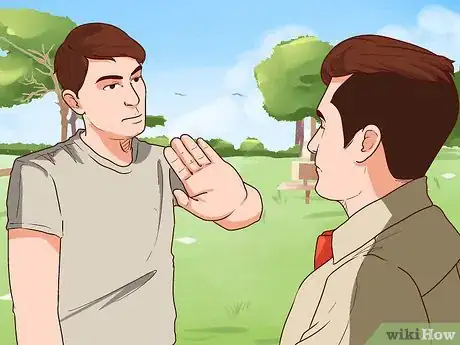This article was co-authored by Dr. Niall Geoghegan, PsyD. Dr. Niall Geoghegan is a Clinical Psychologist in Berkeley, CA. He specializes in Coherence Therapy and works with clients on anxiety, depression, anger management, and weight loss among other issues. He received his Doctorate in Clinical Psychology from the Wright Institute in Berkeley, CA.
This article has been viewed 302,547 times.
Mean friends (sometimes called frenemies) can pose serious problems in your daily life. The challenges of dealing with mean friends can also wreak havoc on your emotions. If you have a mean friend who you either can’t avoid or want to remain friends with due to your extensive history together, you need to develop some strategies for dealing with his or her antics. [1] Keep reading to learn more about how to take control when your mean friend lashes out at you.
Steps
Assessing the Situation
-
1Take stock of the things that your friend does that bother you.[2] When you are alone, think about the things you’re your friend does and identify the reasons why they bother you. Identifying these issues in the relationship will help you to work out strategies for how to cope and, hopefully, improve the relationship. [3] Does she often cancel plans with you at the last minute? Does she yell at you? Does she flirt with that guy that you like, even after you told her that you like him?
- If you have trouble identifying exactly what your friend does that bothers you so much, you may want to discuss your friend with another friend or someone else that you trust. [4]
-
2Deal with your emotions. After you have identified the things that your friend does that bother you, think about how those things make you feel. It is important to acknowledge the pain and other emotions that your friend has caused you and deal with those emotions in a healthy manner.[5] If you refuse to acknowledge your emotions and deal with them, they may erupt in an unexpected or inappropriate manner. [6]Advertisement
-
3Determine whether or not the problem warrants a confrontation.[7] Confronting your friend will be difficult for you and even more difficult for him or her. Before you decide to confront the person, think about whether or not the issue is a big enough deal to require a confrontation. If you confront the person and the issue is rather minor, you may end up looking like you are nit-picking and that can cause more problems in the relationship. [8]
-
4Develop strategies for situations that do not require confrontation. Not all problems are worth confronting your friend about, but you should still prepare yourself to handle common situations that you think may not be worth a confrontation. Having strategies in place can also help you to feel more in control when your mean friend says or does things that upset you. [9]
Confronting a Mean Friend
-
1Wait until your anger has subsided. Don’t confront the person while you are still angry or upset. Wait until you have cooled down and vented your feelings to another friend or in writing. Confronting your friend while you are still angry or feeling hurt makes you seem vulnerable and it may affect the results of your confrontation. [12]
-
2Plan out your complaint. Write out what you want to say to the person to help guide you when you actually confront him or her. If you think you might get flustered during your conversation, having your main points written out on a notecard may help you when you actually deliver the complaint to him or her.
-
3Structure your complaint as a cause and effect statement: “When you _____, it makes me feel _____.”
- Remember to keep your complaint short and to the point. Do not include any unnecessary details in your complaint. Providing too many details will lessen the impact of your complaint and it may leave your friend confused about the exact purpose of your complaint. [13]
- If you feel especially nervous about confronting your friend, you may want to practice with another trusted friend to make yourself feel more confident.
-
4Confront your friend. When you feel prepared to confront your friend, take a deep breath and deliver your complaint how you practiced it. Keep a low, even tone to your voice and be kind and polite as you confront the person. If you seem calm, your friend will be more likely to respond in a like manner.[14]
- Don’t lose control or retort with insults if your friend becomes irate. If things begin to fall apart, simply thank your friend for hearing your complaint and excuse yourself. In a worst case scenario, you can still control your own behavior and you will feel better knowing that you handled the situation in a mature, intelligent manner. [15]
Protecting and Defending Yourself
-
1Learn to love yourself. Part of the reason why certain comments that your mean friend makes may bother you so much is because he or she is commenting on things that you are self-conscious about. One of the easiest ways to defend yourself against these types of remarks is to deepen your acceptance of yourself. Learning to love yourself (even your imperfections) is not easy and it will take time, but working on your relationship with yourself can help to protect you against mean comments and behavior. [16]
- Accept yourself for who you are. Take time each day to appreciate the person you are. Acknowledge your strengths and triumphs (even the small ones.)
- Forgive yourself when you make a mistake. Don’t beat yourself up if you make a mistake, just forgive yourself and move on.
- Treat yourself well. Don’t do things that make you feel uncomfortable or allow others to pressure you into doing things that you don’t really want to do. Do things that make you feel happy and fulfilled.
- Learn to say no. Don’t say yes every time someone asks for a favor or wants you to do something with them.
-
2Defend yourself. If your friend says something mean to you, let him or her know that those comments were hurtful and that you’d like them to lay off. [17]
- At first, respond with a casual comment to let your friend know that his or her comments are hurtful. Try saying something like, “Ouch! That was kind of mean. Could you not say things like that to me, please?” [18]
- If the meanness continues, let him or her know that you are serious by saying something like, “I’m not joking. You are being unnecessarily mean. Knock it off.” [19]
- Practice delivering these requests until they sound natural. [20]
- Be firm when you speak and use direct eye contact so that the person sees that you are confident and serious. [21]
- Be persistent. Don’t stop defending yourself just because the behavior continues. The more you practice this type of self-defense, the more your friend will get the idea that their words are hurtful and that you will not tolerate them. [22]
-
3Respond calmly and kindly. If your friend yells at you, he or she probably expects you to yell back. And if you do yell back, he or she will yell back louder, and so on. Instead of retaliating in like manner to your friend’s anger or meanness, respond calmly and kindly. This unexpected approach will confuse and redirect the behavior. [23]
- For example, if your friend yells at you for a mistake you made, don’t yell back. Respond in a calm, kind voice. Say something like, “I am sorry that what I did upset you, but I don’t think it was such a big deal that we can’t discuss it reasonably.”
-
4Refuse to be insulted, even if it’s passive aggressive or subtle. If your mean friend tends to belittle or speak to you in a condescending tone, respond to this type of behavior by calling him or her out on this behavior. This technique works especially well when others are present who will support your condemnation of this type of negative communication. [24]
- For example, if your friend says something to insult you (or someone else), try responding with something like, “Come on Jimmy, making remarks like that is beneath you. Show everyone that you are better than that.”
-
5Get out of the relationship. If this person is constantly beating you down and refuses to change after you have confronted him or her, your best option is to get out of the relationship. Don’t hope in vain for things to change because it is more likely that they will become worse the longer you are attached to the person. If the person is someone you have to see on a regular basis because you go to school together, work together, or something else, try to engage with the person as little as possible. [25]EXPERT TIPDr. Adam Dorsay is a licensed psychologist in private practice in San Jose, CA, and the co-creator of Project Reciprocity, an international program at Facebook's Headquarters, and a consultant with Digital Ocean’s Safety Team. He specializes in assisting high-achieving adults with relationship issues, stress reduction, anxiety, and attaining more happiness in their lives. In 2016 he gave a well-watched TEDx talk about men and emotions. Dr. Dorsay has a M.A. in Counseling from Santa Clara University and received his doctorate in Clinical Psychology in 2008.Licensed Psychologist & TEDx Speaker

 Adam Dorsay, PsyD
Adam Dorsay, PsyD
Licensed Psychologist & TEDx SpeakerIf you're not sure whether or not it's worth staying in the relationship, ask yourself how you feel immediately after hanging out with this person. Do you feel happier? Do you feel championed? Do you feel heard? Or do you feel like your friend didn't really listen to you or take interest in you? How you feel after spending time with your friend says a lot about whether or not this is a friendship that is worth saving.
Expert Q&A
-
QuestionWhat should I do if I have a friend that does not support me emotionally?
 Dr. Niall Geoghegan, PsyDDr. Niall Geoghegan is a Clinical Psychologist in Berkeley, CA. He specializes in Coherence Therapy and works with clients on anxiety, depression, anger management, and weight loss among other issues. He received his Doctorate in Clinical Psychology from the Wright Institute in Berkeley, CA.
Dr. Niall Geoghegan, PsyDDr. Niall Geoghegan is a Clinical Psychologist in Berkeley, CA. He specializes in Coherence Therapy and works with clients on anxiety, depression, anger management, and weight loss among other issues. He received his Doctorate in Clinical Psychology from the Wright Institute in Berkeley, CA.
Clinical Psychologist Not everybody needs their friends to be equally emotionally supportive. Some people actually prefer to be the one who gives a lot of support. At some point in the relationship, you'll have to make a choice. Does this person show up for you when you need them? If not, then does it work for you and can you tolerate it? It could be that you have a greater need for emotional support than this friend can give.
Not everybody needs their friends to be equally emotionally supportive. Some people actually prefer to be the one who gives a lot of support. At some point in the relationship, you'll have to make a choice. Does this person show up for you when you need them? If not, then does it work for you and can you tolerate it? It could be that you have a greater need for emotional support than this friend can give.
References
- ↑ http://www.scientificamerican.com/article/fickle-friends/?page=2
- ↑ Dr. Niall Geoghegan, PsyD. Clinical Psychologist. Expert Interview. 24 July 2019.
- ↑ http://greatergood.berkeley.edu/raising_happiness/post/how_to_deal_with_mean_people
- ↑ http://lifehacker.com/5909055/how-to-productively-call-people-out-on-their-bs-without-being-an-asshole
- ↑ Dr. Niall Geoghegan, PsyD. Clinical Psychologist. Expert Interview. 24 July 2019.
- ↑ http://greatergood.berkeley.edu/raising_happiness/post/how_to_deal_with_mean_people
- ↑ Dr. Niall Geoghegan, PsyD. Clinical Psychologist. Expert Interview. 24 July 2019.
- ↑ http://lifehacker.com/5909055/how-to-productively-call-people-out-on-their-bs-without-being-an-asshole
- ↑ http://www.scientificamerican.com/article/fickle-friends/?page=2
- ↑ http://www.scientificamerican.com/article/fickle-friends/?page=2
- ↑ http://www.scientificamerican.com/article/fickle-friends/?page=2
- ↑ http://lifehacker.com/5909055/how-to-productively-call-people-out-on-their-bs-without-being-an-asshole
- ↑ http://lifehacker.com/5909055/how-to-productively-call-people-out-on-their-bs-without-being-an-asshole
- ↑ Dr. Niall Geoghegan, PsyD. Clinical Psychologist. Expert Interview. 24 July 2019.
- ↑ http://lifehacker.com/5909055/how-to-productively-call-people-out-on-their-bs-without-being-an-asshole
- ↑ http://www.oprah.com/relationships/The-Perfect-Comeback-for-Your-Passive-Aggressive-Friends
- ↑ http://www.oprah.com/relationships/The-Perfect-Comeback-for-Your-Passive-Aggressive-Friends
- ↑ http://www.oprah.com/relationships/The-Perfect-Comeback-for-Your-Passive-Aggressive-Friends
- ↑ http://www.oprah.com/relationships/The-Perfect-Comeback-for-Your-Passive-Aggressive-Friends
- ↑ http://www.oprah.com/relationships/The-Perfect-Comeback-for-Your-Passive-Aggressive-Friends
- ↑ http://www.oprah.com/relationships/The-Perfect-Comeback-for-Your-Passive-Aggressive-Friends
- ↑ http://www.oprah.com/relationships/The-Perfect-Comeback-for-Your-Passive-Aggressive-Friends
- ↑ http://www.oprah.com/relationships/The-Perfect-Comeback-for-Your-Passive-Aggressive-Friends
- ↑ http://www.oprah.com/relationships/The-Perfect-Comeback-for-Your-Passive-Aggressive-Friends
- ↑ http://www.oprah.com/relationships/The-Perfect-Comeback-for-Your-Passive-Aggressive-Friends
- ↑ http://www.huffingtonpost.com/2014/04/15/love-yourself-unconditionally-deepak-chopra_n_5120399.html
- ↑ http://www.scientificamerican.com/article/fickle-friends/?page=2
- ↑ http://www.scientificamerican.com/article/fickle-friends/?page=2
About This Article
Dealing with a mean friend can get you down, but if you stand up for yourself and tell them how you feel, they may treat you better. If your friend insults you, don't be afraid to defend yourself. Say something like, "That was kind of mean. You shouldn't say stuff like that." Keep in mind that often people are mean because they actually feel insecure themselves. So try not to take their insults too personally. The more you defend yourself against nasty comments, the more they should learn to back off. However, some people aren't self-aware enough accept criticism. If they don't get the message and keep insulting you after you've repeatedly told them to stop, you’re probably better off finding friends who treat you right. For more tips, including how to accept things you don’t like about yourself, read on.
